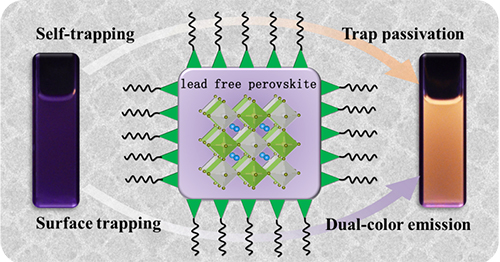The charge-carrier dynamics of lead-free perovskite nanocrystals revealed by the group of Profs. HAN Keli from the State Key Laboratory of Molecular Reaction Dynamics in the Dalian Institute of Chemical Physics (DICP) of the Chinese Academy of Sciences have captured greater researchers' attention. Recently,a review article entitled "Charge-Carrier Dynamics of Lead-Free Halide Perovskite Nanocrystals" has been invited to publish in Acc. Chem. Res.

Charge-carrier dynamics of lead-free halide perovskite nanocrystals (Image by YANG Bin)
Understanding the charge-carrier dynamics of semiconductors is crucial to improve their optical properties. In this Account, recent research progresses on the study of charge-carrier dynamics in air-stable lead-free perovskite nanocrystals were reviewed. The exciton trapping followed by nonradiative recombination was the major carrier relaxation pathway and resulted in a low photoluminescence quantum efficiency (PLQE).
The charge-carrier dynamics indicate that the sub-band-gap exciton trapping processes were dominated by ultrafast (~1–2 ps) intrinsic self-trapping and trapping at surface defects (~50–100 ps). A feasible route for passivating surface traps and tuning the self-trapped excitons from “dark” (nonradiative) to “bright” (radiative) was proposed. Through this strategy, the PLQE could be increased over 100-fold. In addition, several photophysical properties of lead-free perovskite nanocrystals have been compared with that of lead perovskite nanocrystals, such as charge-carrier relaxation, exciton-phonon coupling, and hot-carrier cooling. (Text by YANG Bin)